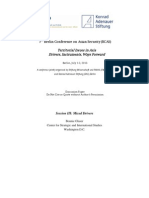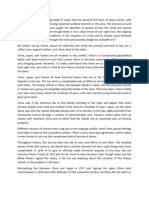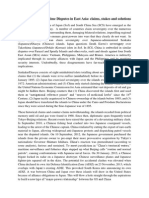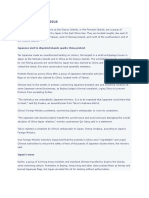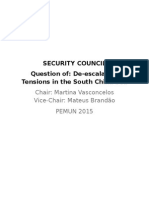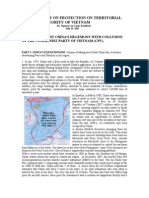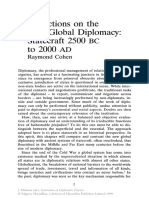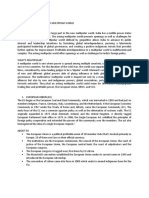Senkaku War Is Likely and Draws in The US - Prefer Predictive Evidence Langerman '13
Senkaku War Is Likely and Draws in The US - Prefer Predictive Evidence Langerman '13
Uploaded by
Anonymous cGMk7iWNbCopyright:
Available Formats
Senkaku War Is Likely and Draws in The US - Prefer Predictive Evidence Langerman '13
Senkaku War Is Likely and Draws in The US - Prefer Predictive Evidence Langerman '13
Uploaded by
Anonymous cGMk7iWNbOriginal Description:
Original Title
Copyright
Available Formats
Share this document
Did you find this document useful?
Is this content inappropriate?
Copyright:
Available Formats
Senkaku War Is Likely and Draws in The US - Prefer Predictive Evidence Langerman '13
Senkaku War Is Likely and Draws in The US - Prefer Predictive Evidence Langerman '13
Uploaded by
Anonymous cGMk7iWNbCopyright:
Available Formats
Senkaku war is likely and draws in the US prefer
predictive evidence
Langerman 13 [Aaron, Foucault connoisseur, AN ESCALATING CRISIS:
WHY CHINA AND JAPAN MIGHT GO TO WAR, 2/4/13,
http://tuftsobserver.org/an-escalating-crisis-why-china-and-japan-might-go-towar/]
The prospect of conflict between China and Japan is rising drastically over a set of
small uninhabited islands known as the Senkaku Islands in Japan and the Diaoyu Islands in China.
Diplomatic talks have stalled while nationalistic sentiments in both countries
have grown louder over the seemingly insignificant islands. Both China and Japan are
ramping up their military spending and the waters surrounding the islands
are becoming increasingly militarized. With little prospect of a sustainable solution, the
second and third largest economies in the world may well be sliding towards war. The Senkaku/Diaoyu
Islands lie in a strategic location in the East China Sea, roughly halfway between Japan and China. The
continental shelf surrounding the islands is rich in oil and natural gas. Japan currently owns the islands, but
China disputes that claim, arguing that Japan illegitimately colonized them during its imperial past. In its
defense, Japan states they discovered the islands in 1884. In addition, the United Nations Convention on
the Law of the Seas (UNCLOS) gives Japan sovereignty over the islands. A series of recent political
blunders on Japans part, however, redefined the question of sovereignty into a territorial dispute. In 2010,
when a Chinese fishing trolley trespassed into the waters surrounding the islands, the Japanese Coast
Guard arrested the captain of the Chinese ship and brought him into custody. In protest, China suspended
rare earth mineral exports to Japan, which in turn took a severe toll on Japans economy. The crisis
deepened in September 2011, when Tokyos ultra-nationalist mayor attempted to purchase the islands
himself to ensure Japanese control. Aware that such a move might be incendiary, the Japanese central
government clumsily prevented the mayor from buying the islands, announcing its plan to nationalize
them instead. The plan backfired, inviting the argument that Japan never had legitimate control over the
islands in the first place. Moreover, China interpreted nationalizing as colonizing and loudly protested the
move. In the last few months, tensions have escalated, and both countries have become increasingly
In over a hundred cities across China,
thousands of protesters took to the streets, vandalizing Japanese restaurants,
stores, and cars. The anxious Japanese public elected the conservative Shinz
Abe as their new Prime Minister based upon his hawkish promises to deter
China. For the first time in more than a decade, Japan increased military
spending by over 180 billion yen (roughly $2 billion) at the beginning of
January. A week later, China sent surveillance vessels and patrol planes over
the islands. Japan responded by scrambling fighter jets and threatening to
respond with warning shots if China repeats the provocation. This territorial
dispute is particularly worrisome because, at this point, there is no
adamant about sovereignty over the islands.
diplomatic solution that will satisfy China, short of full control over the islands.
Both countries are dealing with nationalist publics who urge for military answers to
territorial disputes. The US has reaffirmed its commitment to defend Japan in case
of Chinese aggression, which raises the possibility that the US might be
drawn into a conflict if it occurs. Military conflict may appear
inevitable for these two nations, but only time will tell if they can manage to find an
alternate solution to appease their opponents aggression.
You might also like
- Summary of Cassese, International LawDocument95 pagesSummary of Cassese, International LawEbunoluwa OlayemiNo ratings yet
- 2012 08 22 - SenkakuDocument2 pages2012 08 22 - Senkakuabhi37No ratings yet
- Maritime Territorial Disputes and East Asia 2Document46 pagesMaritime Territorial Disputes and East Asia 2Son VuNo ratings yet
- Chinese Navy Powers Into New WatersDocument2 pagesChinese Navy Powers Into New WaterschanwfungNo ratings yet
- Orthodox View: The Riddle of The Scarborough ShoalsDocument9 pagesOrthodox View: The Riddle of The Scarborough ShoalsSernande PenNo ratings yet
- Scarborough Shoal ReportDocument15 pagesScarborough Shoal ReportRod Rafael De LeonNo ratings yet
- Tugas UASDocument11 pagesTugas UASAbdul NajibNo ratings yet
- Fileadmin Contents Products Projekt Papiere BCAS2013 Bonnie GlaserDocument9 pagesFileadmin Contents Products Projekt Papiere BCAS2013 Bonnie GlaserAxel Lee WaldorfNo ratings yet
- I. Historical Background of The DisputeDocument6 pagesI. Historical Background of The DisputeJay-Ann EscorelNo ratings yet
- South China SeaDocument4 pagesSouth China Seahussainfawad1313No ratings yet
- The Diaoyu-Senkaku Islands DisputeDocument20 pagesThe Diaoyu-Senkaku Islands DisputeTim LittleNo ratings yet
- 3 - Top5 Disturbing! East China Sea Dispute, Full DocumentaryDocument6 pages3 - Top5 Disturbing! East China Sea Dispute, Full DocumentaryRukhsar TariqNo ratings yet
- South China SeaDocument50 pagesSouth China SeaSanaGigiNo ratings yet
- ClosIng CasE Tiny IslandsDocument3 pagesClosIng CasE Tiny IslandsWiranti AyuningtiyasNo ratings yet
- Territorial Disputes, Trade and Diplomacy: Examining The Repercussions of The Sino-Japanese Territorial Dispute On Bilateral TradeDocument10 pagesTerritorial Disputes, Trade and Diplomacy: Examining The Repercussions of The Sino-Japanese Territorial Dispute On Bilateral TradeAreej TahirNo ratings yet
- Moore 2014 in Your FaceDocument23 pagesMoore 2014 in Your FaceLady Paul SyNo ratings yet
- Territorial and Maritime Disputes in East AsiaDocument3 pagesTerritorial and Maritime Disputes in East AsiaTsering TopgyalNo ratings yet
- Senkaku Islands Issue: Japanese Visit To Disputed Islands Sparks China ProtestDocument4 pagesSenkaku Islands Issue: Japanese Visit To Disputed Islands Sparks China ProtestAaesta PriyestaNo ratings yet
- HistoryofjpnDocument2 pagesHistoryofjpnEliza FloresNo ratings yet
- Puto - Ir Term PaperDocument9 pagesPuto - Ir Term PaperJoshua Ismael PutoNo ratings yet
- GeopolDocument4 pagesGeopoldansstanfieldNo ratings yet
- Japan and The Uses of AdversityDocument4 pagesJapan and The Uses of AdversityZeyu LiuNo ratings yet
- For The Glory of Uploading SomethingDocument9 pagesFor The Glory of Uploading SomethingJoshua Ismael PutoNo ratings yet
- Bản gốc tài liệu tham khảo Điếu NgưDocument74 pagesBản gốc tài liệu tham khảo Điếu Ngư2156040135No ratings yet
- South China Sea Study GuideDocument8 pagesSouth China Sea Study Guideapi-297586186No ratings yet
- Politics 2Document3 pagesPolitics 2Earl Joshua AdvinculaNo ratings yet
- NYU Abu Dhabi Application EssayDocument3 pagesNYU Abu Dhabi Application EssayjenniferuglyNo ratings yet
- The South China Sea Disput A Brief HistoryDocument6 pagesThe South China Sea Disput A Brief HistoryHon MendozaNo ratings yet
- South China Sea ResearchDocument3 pagesSouth China Sea Researchcool.ryter102No ratings yet
- Q and A China JapanDocument10 pagesQ and A China Japanchvez44No ratings yet
- Sources - Japan MapDocument22 pagesSources - Japan MaplauriheyerNo ratings yet
- UBBVSVTLTLHQ ProtestAug2011 - Tài liệu đã gởi LHQ nhân phiên họp 19-9-2011 sắp tới: Phản Kháng Bành Trướng Bắc Kinh và Lên Án VC làm tay sai bán nướcDocument29 pagesUBBVSVTLTLHQ ProtestAug2011 - Tài liệu đã gởi LHQ nhân phiên họp 19-9-2011 sắp tới: Phản Kháng Bành Trướng Bắc Kinh và Lên Án VC làm tay sai bán nướcCoVangNo ratings yet
- Jearalu AssignmentDocument3 pagesJearalu AssignmentJearalu MarquezNo ratings yet
- Pros and Cons - Atomic BombsDocument4 pagesPros and Cons - Atomic Bombs123samafazilNo ratings yet
- Simulation 2 Policy Position MemoDocument12 pagesSimulation 2 Policy Position Memoapi-652934259No ratings yet
- Issued A MapDocument10 pagesIssued A MapgeergersNo ratings yet
- South China Sea Arbitration Background and HistoryDocument16 pagesSouth China Sea Arbitration Background and HistoryKevin LavinaNo ratings yet
- Un Special Political and Decolonization CommitteeDocument19 pagesUn Special Political and Decolonization CommitteeRiyaDagaNo ratings yet
- Assignment 9-14 South China Sea DisputeDocument5 pagesAssignment 9-14 South China Sea DisputeSunshine Glory EgoniaNo ratings yet
- A Special Report On ChinaDocument6 pagesA Special Report On ChinaAttqa NazNo ratings yet
- The Senkaku Islands Dispute Between Japanand China ANoteon Recent TrendsDocument14 pagesThe Senkaku Islands Dispute Between Japanand China ANoteon Recent Trendsoryx90oryxNo ratings yet
- Russo-Japan Negotiation Conflict: Problems of The Past Living On TodayDocument7 pagesRusso-Japan Negotiation Conflict: Problems of The Past Living On TodayShelli Da'NealNo ratings yet
- Concept PaperDocument9 pagesConcept Papershamel marohomNo ratings yet
- 05.04.2023 - Case Analysis - Tiny IslandsDocument2 pages05.04.2023 - Case Analysis - Tiny Islandsrosine NdikubwimanaNo ratings yet
- SCC AssignmentDocument10 pagesSCC AssignmentZunaira AmjadNo ratings yet
- Geopolitical Implications of The Sino-Japanese East China Sea Dispute For The U.SDocument41 pagesGeopolitical Implications of The Sino-Japanese East China Sea Dispute For The U.S王大明No ratings yet
- Contention 1: Inherency: ChalmersDocument11 pagesContention 1: Inherency: ChalmersJaysen BazileNo ratings yet
- AI PacificPredicament NyeDocument9 pagesAI PacificPredicament NyetanphongphutuNo ratings yet
- RS 110309 Spratlys 2Document3 pagesRS 110309 Spratlys 2severeyesNo ratings yet
- DEBUNKEDDocument2 pagesDEBUNKEDRex AngeloNo ratings yet
- UNSC IntraMUN'23Document14 pagesUNSC IntraMUN'23ayesha batoolNo ratings yet
- Imp of SCSDocument6 pagesImp of SCSadityaNo ratings yet
- Territorial Disputes in West Philippine Sea: The Stand of The PhilippinesDocument8 pagesTerritorial Disputes in West Philippine Sea: The Stand of The PhilippinesJellane SeletariaNo ratings yet
- Tugas Sea China DisputeDocument11 pagesTugas Sea China DisputeAbdul NajibNo ratings yet
- US Oil EmbargoDocument10 pagesUS Oil EmbargoRRFNo ratings yet
- Policy Memo Final Pol569a Santos JoshuaDocument11 pagesPolicy Memo Final Pol569a Santos Joshuaapi-656183331No ratings yet
- West PH Sea1Document25 pagesWest PH Sea1Denielle FranciscoNo ratings yet
- Japan's Island Problem - Alexis Dudden 2014Document10 pagesJapan's Island Problem - Alexis Dudden 2014AaromTinocoGutarraNo ratings yet
- World DisputesDocument14 pagesWorld Disputeskalhorog02No ratings yet
- 2 Mathematical Preliminaries: N N 1 N 1 NDocument2 pages2 Mathematical Preliminaries: N N 1 N 1 NAnonymous cGMk7iWNbNo ratings yet
- Anao MPR 2016 17 Pdss4 Mrh90helicoptersDocument12 pagesAnao MPR 2016 17 Pdss4 Mrh90helicoptersAnonymous cGMk7iWNbNo ratings yet
- Meran - Terlan - Bozen Merano - Terlano - Bolzano: TäglichDocument1 pageMeran - Terlan - Bozen Merano - Terlano - Bolzano: TäglichAnonymous cGMk7iWNbNo ratings yet
- Elections DA - 2016Document227 pagesElections DA - 2016Anonymous cGMk7iWNbNo ratings yet
- Security K: The Threat of Nuclear Annihilation Has Stimulated Us To Understand What It Is ANDDocument1 pageSecurity K: The Threat of Nuclear Annihilation Has Stimulated Us To Understand What It Is ANDAnonymous cGMk7iWNbNo ratings yet
- 2ac at DaDocument4 pages2ac at DaAnonymous cGMk7iWNbNo ratings yet
- Age of Exploration The Columbian ExchangeDocument3 pagesAge of Exploration The Columbian ExchangeAnonymous cGMk7iWNbNo ratings yet
- Ukraine Prosecutor Opens Criminal Case Against Russian Officials - ReutersDocument2 pagesUkraine Prosecutor Opens Criminal Case Against Russian Officials - ReutersAnonymous cGMk7iWNbNo ratings yet
- Ussr PyqDocument1 pageUssr PyqPriyanshu KumarNo ratings yet
- Mercosur: Reyhan Yerlikaya Nur Eylül Buse ÇobanDocument17 pagesMercosur: Reyhan Yerlikaya Nur Eylül Buse ÇobanEmmanuel Rocha ReisNo ratings yet
- Leaflet - ASEANDocument2 pagesLeaflet - ASEANMc KeteqmanNo ratings yet
- Intro To Un System EnglishDocument28 pagesIntro To Un System Englishyovi araoz fernandezNo ratings yet
- RULE Profit Maker (KingOfPips) SWINGDocument4 pagesRULE Profit Maker (KingOfPips) SWINGKenzoe ManuelNo ratings yet
- Asan Visa Ae103787268Document1 pageAsan Visa Ae103787268Karan XetriNo ratings yet
- The Philippines' National Defense Strategy: December 2019Document5 pagesThe Philippines' National Defense Strategy: December 2019JJ MolveNo ratings yet
- WWI Webquest 2023Document4 pagesWWI Webquest 2023reinhardnick2No ratings yet
- Causes of World War I WorksheetDocument5 pagesCauses of World War I WorksheetRyan NashNo ratings yet
- Syllabus Geopolitics DraftDocument4 pagesSyllabus Geopolitics DraftEdwin PadrilananNo ratings yet
- Cuban Missile CrisisDocument2 pagesCuban Missile CrisisContrinseNo ratings yet
- Need For Enlargement of Security Council International LawDocument25 pagesNeed For Enlargement of Security Council International LawNidhi NavneetNo ratings yet
- Foreign Consular Offices in The United StatesDocument136 pagesForeign Consular Offices in The United Statesilinri@gmail.comNo ratings yet
- World War I Began in 1914 After The Assassination of Archduke Franz Ferdinand of AustriaDocument2 pagesWorld War I Began in 1914 After The Assassination of Archduke Franz Ferdinand of AustriaS.M. Rahat Shah Jewel (193012059)No ratings yet
- K4-2020-21-Teori Ir-As 20103Document23 pagesK4-2020-21-Teori Ir-As 20103NickKyNo ratings yet
- US Serbia Strategic DialogueDocument26 pagesUS Serbia Strategic DialoguedragoslavrasetaNo ratings yet
- Cohen Raymond. Reflections On The New Global Diplomacy - Statecraft 2500 BC To 2000 ADDocument2 pagesCohen Raymond. Reflections On The New Global Diplomacy - Statecraft 2500 BC To 2000 ADNikoloz NikolozishviliNo ratings yet
- Protecting The New World Order - It Is Time To Create A United NatDocument37 pagesProtecting The New World Order - It Is Time To Create A United NatDANICA FLORESNo ratings yet
- Worldmaking After Empire: The Rise and Fall of Self-DeterminationDocument10 pagesWorldmaking After Empire: The Rise and Fall of Self-Determinationmilica.starinacNo ratings yet
- Assignment 02 FinalisedDocument11 pagesAssignment 02 FinalisedFaiza GandapurNo ratings yet
- Cold War VietnamDocument17 pagesCold War Vietnamapi-331586704No ratings yet
- Questions and Answers in International LawDocument5 pagesQuestions and Answers in International LawVictor Corpus Javier AtitiwNo ratings yet
- DBQ - America Enters Wwi-1Document7 pagesDBQ - America Enters Wwi-1api-274080339No ratings yet
- Un 2022 Quiz BeeDocument9 pagesUn 2022 Quiz BeeJhon Mark TualdonNo ratings yet
- Geopolitics in The Post Cold WarDocument32 pagesGeopolitics in The Post Cold WarBobby MNo ratings yet
- Learning Log 2Document6 pagesLearning Log 2Diego AlmonacidNo ratings yet
- Spanish American War NotesDocument4 pagesSpanish American War Notesapi-299170303No ratings yet
- Ib Diploma Programme Global Politics HL Undefined Theory v3Document17 pagesIb Diploma Programme Global Politics HL Undefined Theory v3RohanNo ratings yet
- Unit 6Document7 pagesUnit 6ASHNo ratings yet








